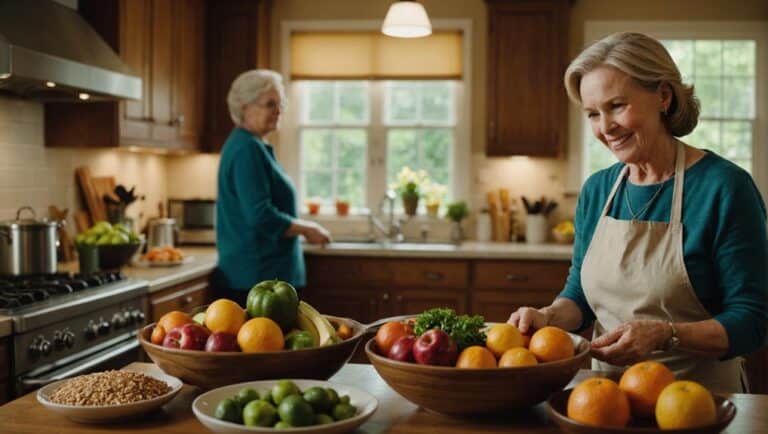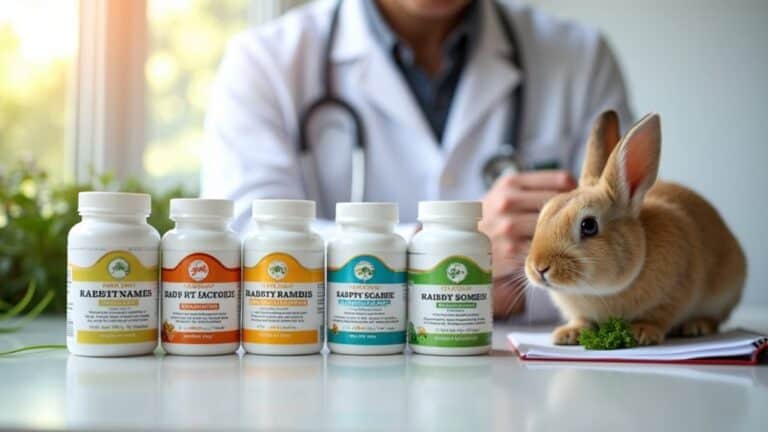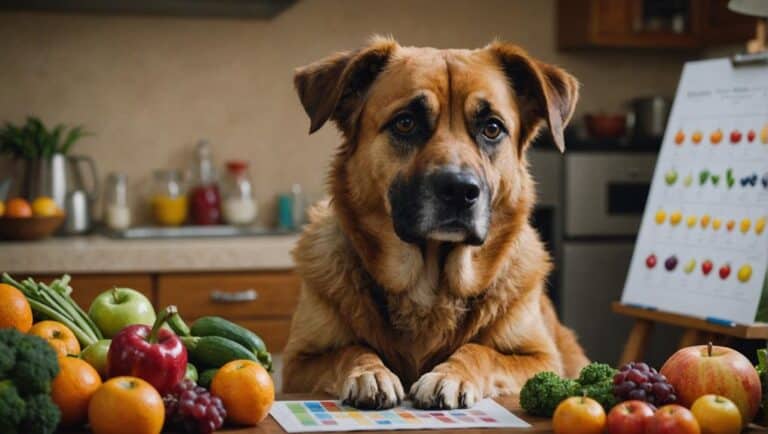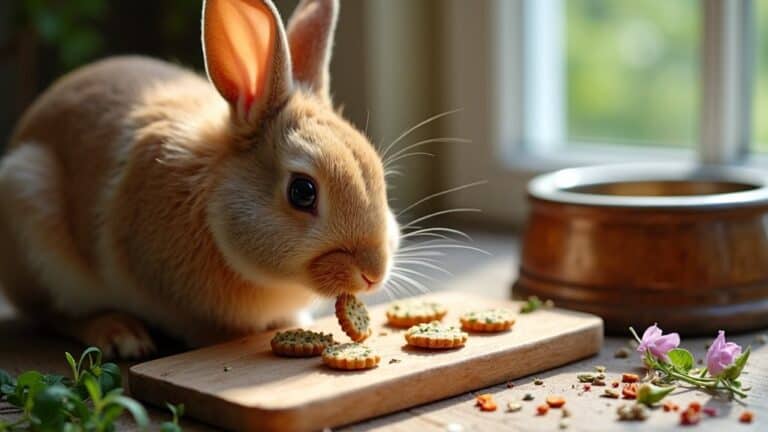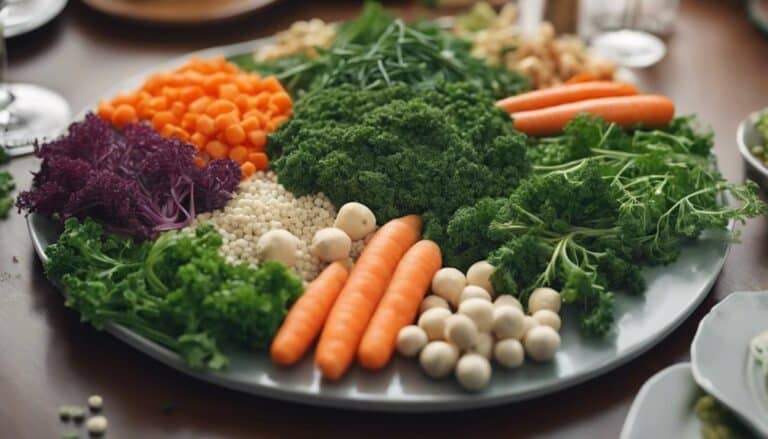Imagine your rabbit's diet as a garden; just like a well-tended garden yields vibrant blooms, a carefully curated diet can lead to a flourishing, healthy bunny.
But how do you navigate this landscape of nutrition choices for your furry friend? Let's explore the key steps and considerations involved in switching to a healthier bunny diet, ensuring your rabbit's well-being is nurtured from the inside out.
Contents
- 1 Key Takeaways
- 2 Importance of Transitioning Slowly
- 3 Assessing Current Diet and Health
- 4 Selecting High-Quality Hay
- 5 Incorporating Fresh Greens Daily
- 6 Introducing Pellets Gradually
- 7 Limiting Sugary Treats
- 8 Monitoring Weight and Health
- 9 Consulting a Veterinarian for Guidance
- 10 Frequently Asked Questions
- 11 What are the key components of a healthy bunny diet that can also improve dental health?
- 12 Conclusion
Key Takeaways
- Transition slowly to prevent digestive issues.
- Offer high-quality hay and fresh greens daily.
- Introduce pellets and treats gradually for balanced nutrition.
- Consult a vet for personalized dietary recommendations and weight monitoring.
Importance of Transitioning Slowly
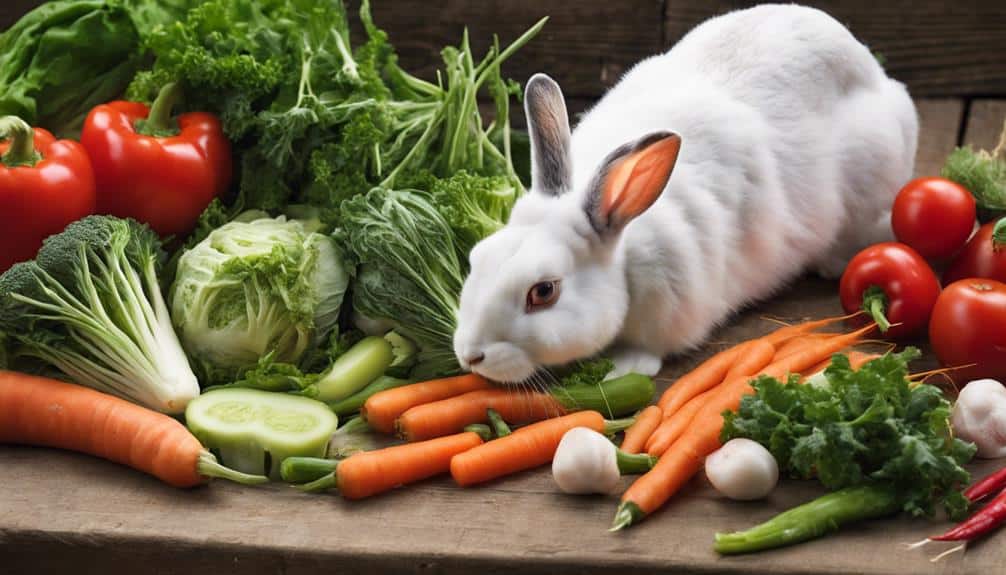
When changing a rabbit's diet, it's important to proceed slowly to prevent digestive issues and allow their gut flora to adjust gradually. A sudden shift in a rabbit's diet can lead to digestive upsets like diarrhea, bloating, or even refusal to eat. To avoid these problems, a gradual shift is recommended. This involves mixing the new foods with the old ones over a period of 1-2 weeks. By following this method, you allow your rabbit to become accustomed to the new diet while still receiving familiar foods.
Monitoring your rabbit's stool consistency and overall health during this adjustment period is vital for a successful diet change. Keep an eye out for any signs of discomfort or irregularities. Adjusting their gut flora slowly helps in maintaining their digestive system's health. Remember that every rabbit is unique, so be patient and observant throughout this process. By taking these steps, you can guarantee a smooth adjustment to a healthier diet for your furry friend.
Assessing Current Diet and Health
Assess your rabbit's diet by examining the types and quantities of hay, pellets, and vegetables they consume daily.
Observe their overall health indicators such as energy levels, coat condition, and weight to gauge the impact of their current diet.
Look out for any signs of digestive disturbances, dental issues, or potential nutrient deficiencies that may necessitate dietary adjustments.
Diet Evaluation Checklist
To properly evaluate your rabbit's diet and health status, begin by examining their access to fresh hay, clean water, and appropriate pellets. It's essential to check for nutritional diversity and balance in their food intake.
Here's a checklist to guide you:
- Guarantee constant access to fresh hay.
- Provide clean water at all times.
- Offer appropriate pellets for a balanced diet.
- Include a variety of leafy greens and vegetables.
- Monitor water intake and source cleanliness.
These steps will help you assess your rabbit's current diet effectively. Remember, consulting with a veterinarian is key to making any necessary adjustments for your rabbit's well-being.
Health Status Assessment
How can you effectively determine the impact of your rabbit's current diet on its health status?
Start by evaluating the types and amounts of hay, pellets, vegetables, and treats your rabbit consumes. Look out for health issues like obesity, dental problems, or digestive disturbances that may be related to its diet.
Evaluate your rabbit's energy levels, coat condition, and overall well-being to gauge the diet's effects on its health. Monitor water intake and hydration levels to guarantee proper hydration, vital for overall health.
If unsure, consult a veterinarian for a thorough health assessment and personalized dietary recommendations tailored to your rabbit's specific needs and health status. Taking these steps will help you optimize your rabbit's diet and promote its well-being.
Selecting High-Quality Hay
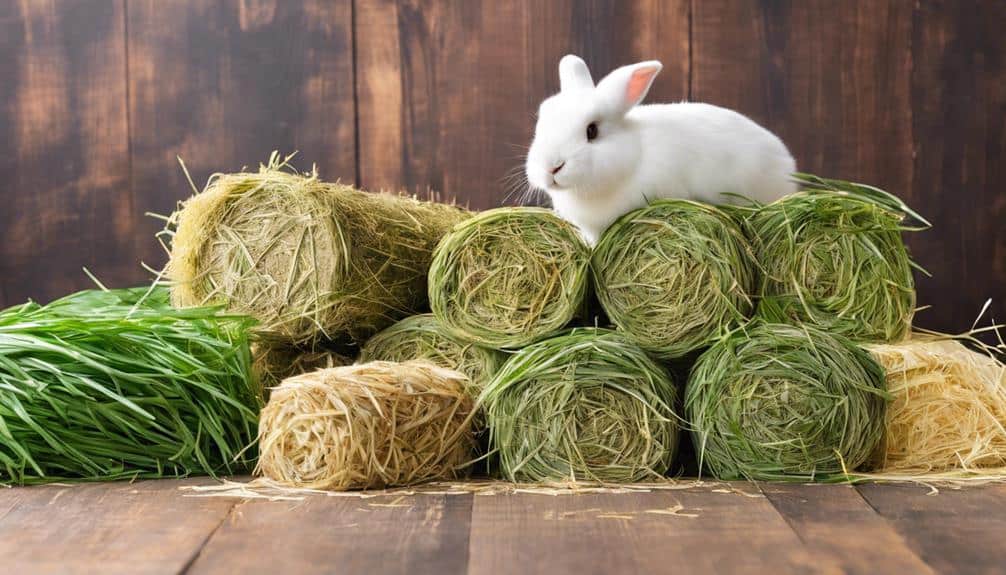
When selecting high-quality hay for your rabbit's diet, prioritize freshness, greenness, and freedom from dust, mold, or pests to guarantee excellent nutrition and health benefits. To make sure your bunny receives the best hay possible, consider the following:
- Opt for hay with long strands and a sweet smell, indicating good nutritional value and palatability for your rabbit.
- Look for hay that's high in fiber to support your rabbit's digestive health and dental wear, promoting overall well-being.
- Consider timothy hay as a staple for adult rabbits, as it provides the right balance of nutrients and fiber essential for their diet.
- Rotate between different types of hay like orchard grass, oat hay, or botanical hays to add variety and prevent boredom in your rabbit's diet.
- Choose hay that's fresh and green, as these qualities ensure your rabbit receives the necessary nutrients for excellent health and well-being.
Incorporating Fresh Greens Daily
Incorporate fresh greens daily to supply essential vitamins and nutrients important for your rabbit's overall health and well-being. Fresh leafy greens such as parsley, kale, and mint offer a balanced diet rich in fiber and nutrients.
Providing daily servings of washed leafy greens not only helps prevent issues like GI stasis but also aids in keeping your rabbit properly hydrated. By incorporating a variety of greens into your rabbit's diet, you can help optimize their health.
Introducing a range of safe greens gradually allows your rabbit's digestive system to adjust, reducing the risk of stomach upsets. It's important to consult with a veterinarian for a safe greens list and proper feeding guidelines to guarantee you're offering the best options for your rabbit.
Properly incorporating fresh greens into your rabbit's daily meals can greatly improve their diet and overall well-being. Remember, a balanced diet is key to keeping your furry friend healthy and happy.
Introducing Pellets Gradually
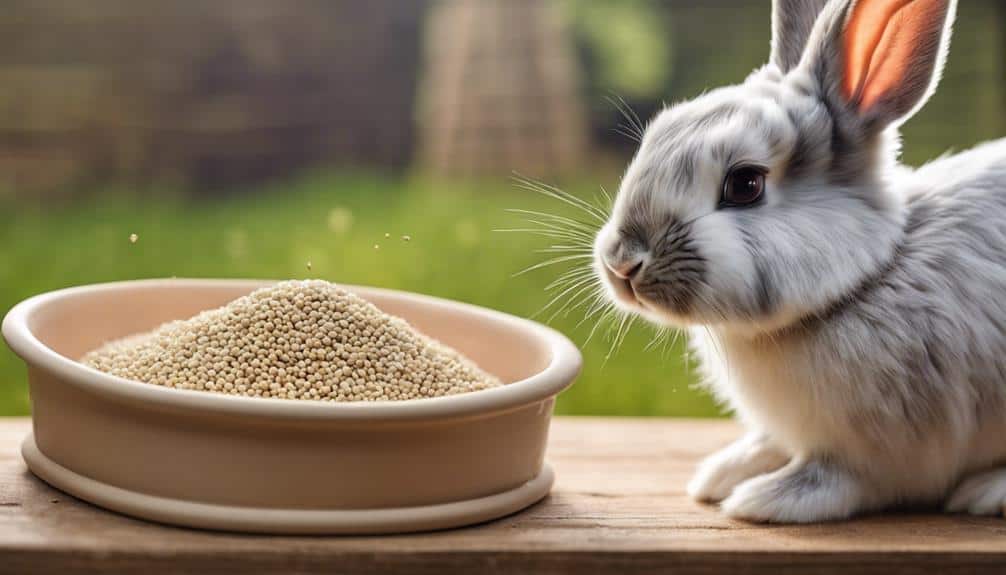
When introducing pellets gradually to your rabbit's diet, remember to mix small amounts with its current food to avoid digestive issues. Watch for any signs of reluctance or digestive problems as you increase the proportion of pellets over 7-10 days.
Providing a balanced diet of hay, vegetables, and pellets during this change period will help make sure your rabbit adjusts smoothly.
Pellet Portion Size
To gradually introduce pellets into your rabbit's diet, begin with a small portion size of 25g per kg of the rabbit's body weight. Gradually increase the amount of pellets over a few days to allow your rabbit's digestive system to adjust.
Here are some key points to contemplate:
- Monitor Weight: Keep an eye on your rabbit's weight and adjust the pellet portion size accordingly for a healthy diet.
- Avoid Sudden Changes: Prevent digestive issues by avoiding sudden changes in the pellet portion size.
- Consult Veterinarian: Seek guidance from a veterinarian for specific recommendations tailored to your rabbit's needs.
- Maintain a Healthy Diet: Make sure your rabbit receives a balanced diet with the right amount of pellets.
- Smooth Shift: Make the shift to a pellet diet smooth and gradual for your rabbit's well-being.
Transitioning From Hay
Gradually introducing pellets alongside hay in your rabbit's diet can aid in acclimating its digestive system to the new food source. Start by mixing a small amount of high-quality, nutritionally balanced pellets with your rabbit's hay.
Over the course of a week, slowly increase the pellet portion while decreasing the hay to allow your rabbit's digestive system to adjust. Throughout this change period, closely monitor your rabbit's stool consistency and overall health to make sure they're adapting well to the dietary change.
If you notice any issues or have concerns, seek guidance from a vet for proper advice. By taking these gradual steps and being attentive to your rabbit's needs, you can help them smoothly adjust to a healthier diet.
Limiting Sugary Treats
Limit sugary treats in your rabbit's diet to prevent obesity and maintain their overall health. When it comes to feeding your bunny, consider the following:
- Obesity Prevention: Excessive sugar intake, often found in treats like fruits and carrots, can lead to obesity in rabbits.
- Dental Health: Sugary treats can contribute to dental issues, so it's essential to limit them.
- Gastrointestinal Concerns: High sugar content in treats can cause gastrointestinal problems for your rabbit.
- Moderation is Key: Offer sugary treats sparingly; they can be used as occasional rewards during training.
- Overall Well-being: Monitoring the intake of sugary treats is essential to guarantee the health and longevity of your pet rabbit.
Monitoring Weight and Health
Considering your rabbit's overall well-being, closely monitoring their weight and health is fundamental to guaranteeing a long and healthy life for your furry companion. Rabbits should have a consistent body weight, neither underweight nor obese, to maintain peak health.
Regularly weigh your rabbit to track any fluctuations and adjust their diet accordingly. Be mindful of the amount of food your rabbit consumes; a diet consisting of mainly high-fiber hay, a small portion of rabbit pellets, and fresh leafy greens is ideal. Avoid overfeeding pellets, as they can be too concentrated and may lead to weight gain. It's important to make gradual changes to your rabbit's diet to prevent digestive system issues.
Watch for signs of obesity, such as difficulty moving or excessive fat, and consult with a veterinarian if you notice any concerns. By keeping a close eye on your rabbit's weight, diet, and overall health, you can guarantee they lead a happy and healthy life.
Consulting a Veterinarian for Guidance
When seeking guidance on your rabbit's diet and health, consulting a veterinarian is essential for tailored advice and expert recommendations. Veterinarians can provide personalized recommendations on the best hay, pellets, and leafy greens suitable for your rabbit's specific age and health requirements. They can assist in addressing any dietary concerns or health issues that your rabbit may be facing, ensuring a balanced and healthy food intake. Additionally, veterinarians can offer guidance on portion sizes, treat options, and maintaining the overall nutritional balance important for your rabbit's well-being. Regular check-ups with a veterinarian are important to monitor your bunny's diet and health, making sure it supports their longevity and happiness.
- Veterinarians can provide tailored advice on changing your rabbit to a healthier diet.
- They can recommend specific hay, pellets, and greens suitable for your rabbit's age and health.
- Consulting a vet can help address any dietary concerns or health issues your rabbit may have.
- Vets can guide you on portion sizes, treat options, and overall nutritional balance for your rabbit.
- Regular check-ups with a veterinarian can make sure your rabbit's diet supports their well-being and longevity.
Frequently Asked Questions
How Do I Change My Rabbit's Diet?
When changing your rabbit's diet, gradually introduce new foods to maintain digestive balance. Monitor stool, appetite, and health. Consult a vet for guidance. Be patient with selective eaters. Adjust slowly for top-notch health benefits.
What Is a Healthy Diet for a Rabbit?
For a healthy rabbit diet, focus on a variety of hay, choose pellets wisely, offer fresh veggies daily, give fruit treats sparingly, provide protein sources like alfalfa, make sure ample water, encourage exercise, monitor dental health, manage weight, consider nutritional supplements.
How Do You Transition Rabbit Food?
When changing rabbit food, gradually mix new with old to avoid digestive issues. Increase hay and greens, reduce pellets slowly. Monitor weight, limit treats, make sure water intake, promote digestive health. Consider vitamin supplements, establish exercise routine for a healthy bunny diet.
When Should I Switch My Rabbit to Adult Food?
When should you switch your rabbit to adult food? Change your rabbit from higher protein and calcium diets during growth stages to adult food around 6 months to 1 year, ensuring proper nutritional needs and digestive system health.
What are the key components of a healthy bunny diet that can also improve dental health?
When it comes to optimizing bunny dental health, a healthy diet is key. The key components include high-quality hay, fresh greens, and limited amounts of pellets. Providing bunny-safe chew toys can also improve dental health by promoting natural wear and preventing dental issues.
Conclusion
To sum up, changing your rabbit to a healthy diet is vital for their overall well-being. While some may worry about the time and effort required for this process, the long-term benefits far outweigh any initial challenges.
By following the steps outlined in this guide and consulting with a veterinarian if needed, you can guarantee your bunny receives the proper nutrition they need to thrive. Remember, a healthy diet is key to a happy and energetic rabbit!

